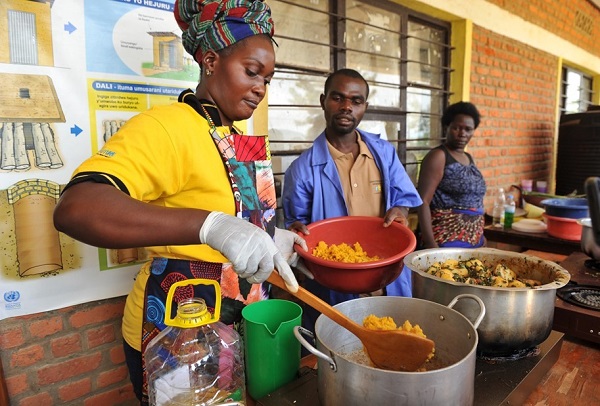
Parents learning how to cook nutrient rich meals for their children. Photo taken at an occasion of Cooking Demonstration through the JICA Loan Project (Before COVID-19 pandemic).
Kigali: On July 21st, JICA disbursed the second tranche of 30% equivalent to 28million USD as a result of achievements of the second set of policy actions by the Government of Rwanda (GoR) in its continuous efforts to improve nutrition through agriculture transformation.
On August 16, 2019, the Governments of Japan and Rwanda agreed on Sector Policy Loan for Nutrition Improvement through Agricultural Transformation of 10 billion yen (approximately USD 93million) to assist Rwanda’s effort to tackle stunting.
In the Loan Agreement signed between Japan International Cooperation Agency (JICA) and the Ministry of Finance and Economic Planning (MINECOFIN), the trigger-based disbursement of the loan has been subdivided into three tranches of 40 %, 30% and 30% to be received over three years. The1sttranche equivalent to 40% (36Million USD) has been subsequently disbursed in December 2019.
Mr. MARUO Shin, Chief Representative of JICA Rwanda Office, appreciated the concerned ministries and agencies of the GoRin achieving the agreed policy actions related to the above disbursement in timely manner, despite challenges faced in the course of implementation, posed by COVID-19 global pandemic. This disbursement is timely because it would assist the GoR in mainstreaming “Nutrition” during the COVID-19 pandemic period when many urban and rural households are suffering from malnutrition.

Children drinking soya-milk. Soya is known having rich protein. Photo taken at an occasion of Cooking Demonstration through the JICA Loan Project (Before the COVID-19 pandemic).
Despite substantial growth in agricultural production over the past 10 years, food security and nutrition remain concerns, especially looking at the vulnerability to shocks at the household level. A large share of the population remains dependent on rain-fed and subsistence agriculture. Some staple food production remains below the targeted demand for domestic consumption and is substituted by importation. Maintaining a healthy diet is vital during the COVID-19 pandemic. According to FAO, a healthy diet supports a strong immune system, while good nutrition is very important before, during and after an infection1.
The Programtargets12 Districts with highest stunting rates namely Rutsiro, Rubavu, Burera, Nyaruguru, Ngororero, Nyamagabe, Nyamasheke, Gakenke, Gisagara, Gicumbi, Musanze and Ngoma District.
At a decentralized level, the program has started to fill food nutrient gap in each target district and suitable nutritious crop has been identified and are being promoted for production. Other components include making crop calendars for irrigation schemes, and nutrition public awareness campaigns. The program is expected to have a big impact in eradicating under nutrition and fighting against stunting. (End)
